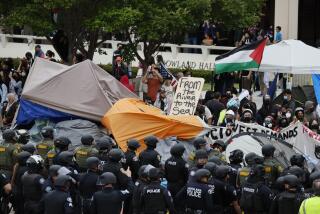S. Africa Warns Colleges on Boycotts, Protests
JOHANNESBURG, South Africa — The South African government warned Wednesday that it will cut off its subsidies to universities unless they put an end to anti-apartheid protests on their campuses.
F. W. de Klerk, the minister of national education, told the heads of universities that they will lose state funds unless they immediately take “all reasonable steps,” as outlined by the government, to “maintain good order and discipline” and ensure “uninterrupted and undisturbed teaching and study.”
He said the civil unrest of the last three years now threatens the universities and is endangering the restoration of order around the country.
“It is a situation that cannot be allowed to continue,” he said.
De Klerk was referring to class boycotts at a number of black universities, some of which have been closed for weeks at a time, and to recent anti-government demonstrations at predominantly white universities. The latter include the University of Cape Town and the University of the Witwatersrand in Johannesburg, where students have clashed with the police.
Speakers Were Attacked
But the most recent incidents, which have been widely criticized by liberal as well as conservative whites, have involved attacks by militant students on several politicians invited to speak on the Cape Town and Witwatersrand campuses.
This week, Denis Worrall, the former South African ambassador to Britain who resigned to run for Parliament as an independent and lost by a narrow margin, was prevented by student demonstrators, mostly blacks, from speaking at Cape Town.
On the following day, Tom Linda, a conservative black politician from eastern Cape province, was assaulted, also mostly by black students, when he tried to speak at Cape Town. He fled amid flailing sticks and a hail of stones.
Campus militants have recently succeeded in preventing speeches by Helen Suzman, the veteran member of Parliament from the Progressive Federal Party; Chief Mangosuthu Gatsha Buthelezi, the moderate Zulu leader; Piet Koornhof, now the South African ambassador to the United States, and Conor Cruise O’Brien, the Irish diplomat and political philosopher.
“There is no place for argument about the subtleties of freedom of speech in an environment of student radicalism,” state-run Radio South Africa said in a commentary justifying the new government orders.
Academic Freedom Limited
Academic freedom in South Africa is significantly more limited than in the United States or Western Europe. Although still widely honored as an ideal, in practice it has been diminished by censorship, the country’s extensive security laws, by recent emergency regulations limiting freedom of speech and assembly and by the detention without charge of many students and teachers.
Piet Clase, the minister of education and culture in charge of white schools, told Parliament later that academic freedom “does not mean that certain students and university personnel can act in a way incompatible with the public interest, as has been the case recently.”
“The community and the government have the right to know what the university authorities are doing about this state of affairs,” Clase said.
De Klerk sought to assure university officials, who had been summoned to the meeting in Cape Town, that if they halt the protests and meet other conditions, the government will not interfere in the day-to-day running of the schools, which get 70% to 80% of their operating funds from the state.
He gave the universities until the end of August to study and comment on the draft regulations, which have been made public only in general terms.
More to Read
Sign up for Essential California
The most important California stories and recommendations in your inbox every morning.
You may occasionally receive promotional content from the Los Angeles Times.










